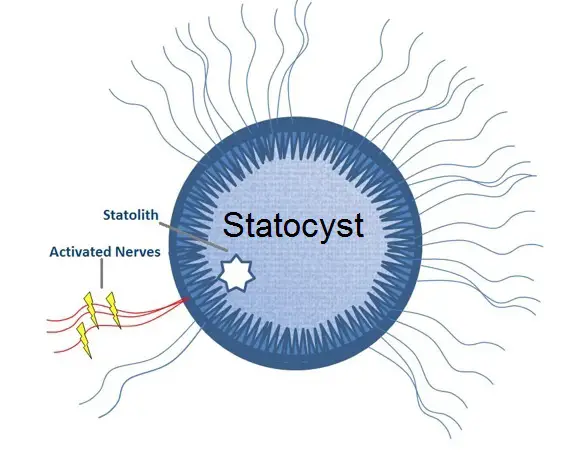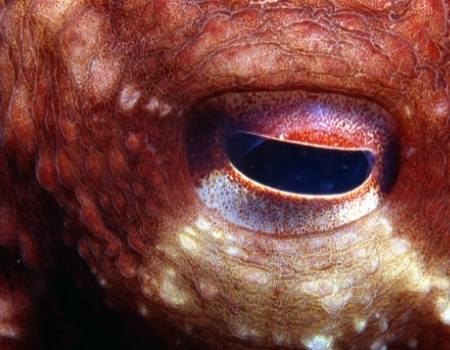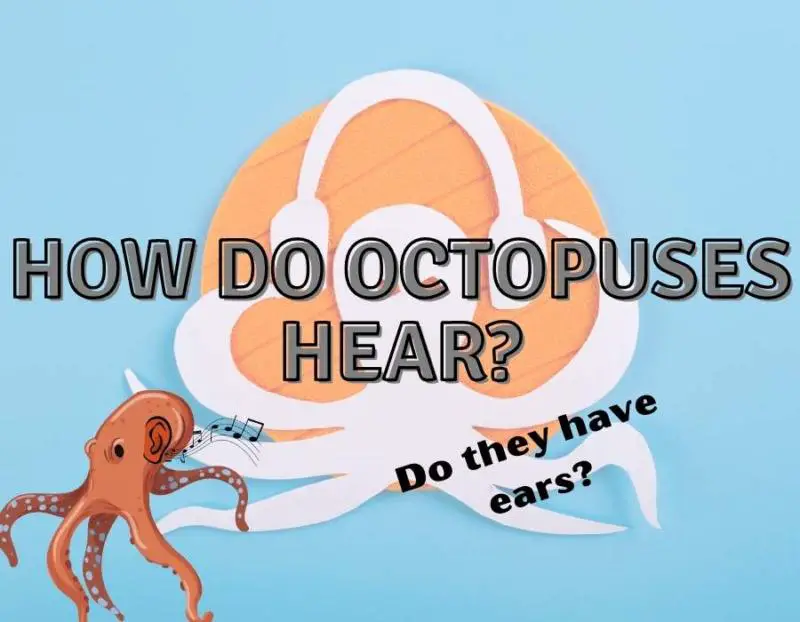Although octopuses can detect sound waves and vibrations in water, they do not have ears. The little hearing that octopuses do have is not particularly good.
Detection of sound waves by octopuses and other Cephalopods is accomplished by the usage of an organ known as a statocyst. The statocyst is a small hard chamber that contains sensory hairs, that can detect vibrations similar to those in human the ear.
While it is possible that octopuses are unable of appreciating the intricacies of a Beethoven Symphony, it is very possible that they are capable of sensing sound waves in the water to a certain extent.
Can an Octopus Hear?
It’s crucial to be aware that there are non-traditional means of “hearing” that may be employed.
In our human world, you may understand what I mean by looking at cases of deaf people being able to detect sound by placing their hands on a vibrating speaker.
Hearing is in its essence, the detection of vibrations in a medium such as air or water.
The ability to differentiate variations in vibrations to such a degree that some persons can recognize musical patterns or specific phrases in background noise has been demonstrated in several studies.
However, while octopuses do not have the ability to “hear” in the traditional sense, this does not rule out the possibility that they might detect sound frequencies reverberating through the water and detecting them.
Neither the ears nor the eardrums are required in order to distinguish between different sound frequencies, therefore there are many ways of hearing although few as effective as an eardrum-equipped ear.
How Do Octopuses Hear?
Octopuses do not have a chamber, such as a swim bladder, which is utilized by many fish to sense the presence of other animals.
Animals such as octopuses, squids, and lobsters, on the other hand, rely on a different organ known as the statocyst to hear and balance their surroundings.

Following this discovery, it was discovered that octopuses can record noises in the range of 400 to 1000 Hz, with the frequencies at 600 Hz being the most audible of these recordings.
Although the octopus is capable of hearing, its capacity to hear is limited since they don’t have a chamber or organ to amplify sounds, which is present in other sea animals such as fish.
What Other Senses Do Octopuses Rely on Then?
The gustatory and visual systems are the most prominent sensory systems in octopuses.
The gustatory consists of nerve endings able to detect chemicals in the water and thus corresponds to our ability to taste and smell.
It was discovered that the octopus suckers’ skin contained two types of detectors: mechanosensory cells (cells found in other animals that assist them in sensing pressure or vibrations) and chemosensory cells (which contain receptors that assist octopuses in detecting chemicals in the water e.g. released by prey or attacker).
A miniature brain is housed in each of an octopus’s eight arms, allowing the animal to explore the ocean floor in search of food with each of its arms as it moves through the water.
According to a new study, both taste- and touch-oriented cells are critical in guiding octopuses in recognizing whether to hunt and when to withdraw from a predatory situation.
Do Octopuses Have Noses?
Octopuses do not have noses in their bodies. Their olfactory system is somewhat different to a human one.
Using scent sensors in minute “dimples” on the mantel, which were identified by scientists, it is possible to detect scents coming from a considerable distance.
While their suckers are equipped with chemical sensors that allow them to “taste” compounds from the things with which they come into contact, their mouths are not equipped with chemical sensors.
Do Octopuses Have Eyes?
If you take a look at any of the more than 300 octopus species, you will see that three physical characteristics are shared by every one of them. The following are some of these characteristics:
All octopuses have large visible eyes as well as eight limbs and a large head in common.
The “camera variety” of the octopus’s eye is distinguishable from the other types of eyes by its shape and function. The human eye is categorized in the same way as the animal eye.
Octopus and Cephalopodseyes and human eyes have a lot in common in terms of traits and qualities.

Can octopuses see colors?
Octopuses’ photoreceptor diversity differs from that of other animals that see colors, which sparked the initial theory that they were colorblind, which was later debunked.
When they were first discovered, it was assumed that their eyesight was confined to only viewing the world in black and white or varied shades of blue.
So why does the color blue represent anything important for octopuses?
Blue light is the most prominent wavelength of direct daylight, and the presence of light is strongly coupled to the octopus ability to change its skin color to deceive predators.
The pigment of octopuses’ eyes is similar to those of its skin, called opsin, which allows it to adjust its color according to the amount of light.
This also led to the idea that octopuses could only see blue light.
However, it has been demonstrated that this was not the case. In order to form a colorized vision, the octopus processes multiple light wavelengths and combines them in the optic nerve and brain.
So rather than having different receptors that detect colors, this is accomplished by combining micro-movements of the retina with the lens movement involved in focusing to produce a colorized image.
This is performed by the use of micro-movements of the retina in combination with the lens movement that occurs during the concentrating process.
However, despite the fact that this is an entirely new form of color processing, computer simulations indicate that it may be effective.
So Do Octopuses Have Good Eyesight?
Octopus vision is blurry, but the degree of blurriness changes based on the color of the object they are looking at and the amount of light present.
It is believed that octopuses have a sort of dual vision, where they see colors in a somewhat blurred way but with the ability to switch to a more clear vision in black and white at night time.
This is actually somewhat similar to the rod and cone anatomy of the human eye where the cones are used to see colors but unable to work in low light. For us, vision is taken over by the black and white only vision performed by the rods when light is insufficient.
The things that are purer in color, such as yellow or blue, that is found in abundance on coral reefs, rocks, and algae and on which they may relatively properly focus, on the other hand, are more difficult to concentrate on due to the dual focus mode and trade-offs between color and clarity.
Conclusion
So, can octopuses hear? According to some research, it seems that they can sense vibrations in water and may be able to distinguish certain frequencies.
However, the octopus’s capacity to hear is limited since they don’t have ears or an organ that amplifies sound like other sea creatures do.
Additionally, octopuses rely on their other senses such as taste and touch to locate food or avoid predators.




